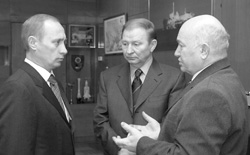Kuchma and Putin focus on economic cooperation

Leonid Kuchma has called the meeting in Dnipropetrovsk “a tremendous step forward.”
“The meeting was positive and fruitful,” echoed Vladimir Putin.
“Extremely pragmatic, economic, and even technological,” Interfax quotes Putin’s deputy chief of staff Sergei Prikhodko.
There were fears on the eve of the Dnipropetrovsk summit both in Ukraine and in Russia that with the cassette scandal still unsolved the declared pragmatism of the meeting might have negative political repercussions, obviously specific for each country. Russia’s Duma Deputy Speaker Vladimir Lukin told Interfax that Putin’s visit to Dnipropetrovsk was “controversial, binding and simultaneously very risky. I hope the risks facing Russian President will be justified. Am I convinced of this? Unfortunately, not completely.” On their part, the Ukrainians were anxious lest the Russian President should take advantage of our domestic political snafu to dictate his own rules forcing Kyiv to start looking East, especially since the Russians, unlike Western politicians, are ignoring the Ukrainian crisis. Speaking in Austria on the eve of the Ukrainian summit, Pres. Putin said, “There are critical political problems” in Ukraine, and Russia cannot ignore them since they make a certain impression on Moscow. Nevertheless, we will negotiate with those who were democratically elected by the Ukrainian people. Leonid Kuchma is Ukraine’s legitimately elected president,” NTV quotes Putin as having said. Russia has no plans to curtail cooperation with Ukraine since it expects some stability in its links with Ukrainian partners, the Russian head of state added. According to him, in its drive for cooperation Russia is not going to be stopped by any internal political developments in Ukraine, for “there is tremendous cooperation. There is an 80% mutual dependence on each other in some sectors and Ukraine heavily depends on our supplies. In certain other areas we are 50 to 60% dependent on Ukraine.” Judging by official reports, the Ukrainian and Russian leaders focused on economic cooperation. The presidents decided to expand joint efforts in the aerospace sector. Ukrainian and Russian negotiators also signed a memorandum on cooperation in energy between the government of Ukraine and the United Energy Systems of Russia, as well as exchanged twelve other documents signed earlier. Vice Premiers Oleh Dubyna and Ilia Klebanov have agreed to meet in March to discuss the expansion of a project aimed to start production of the An-70 plane, in which Germany has showed increasing interest. Constructing a bridge across the Strait of Kerch is likely to become another joint project, but both sides have thus far decided that closer study of the project is required. One of the most controversial documents, a memorandum on hooking up Ukraine’s and Russia’s power grids for parallel operation, is a mere declaration of intent. Signed by Ukrainian Fuel and Energy Minister Serhiy Yermilov and the CEO of the United Energy Systems of Russia Anatoly Chubais, it also announces the intended transit by Russia of its electricity via Ukraine. “In my view, the outcome of the talks is quite beneficial for both sides, Director of the National Institute for Ukrainian-Russian Relations Serhiy Pyrozhkov said in his interview with Forum (www.for.com.ua). “Based on the content of the agreements, one can foresee equal and mutually beneficial cooperation between Ukraine and Russia in the defense, space, and other sectors. I believe the Ukrainian political situation did not affect the outcome of the summit.”
Clearly the presidents have succeeded in dispelling the fears of Western mass media which were blowing the whistle before the summit on the likelihood of restoring the joint production of missiles by Ukraine and Russia.
Speaking at the summit, Pivdenmash General Director Yuri Alekseyev declared, “Ukraine has accepted its non-nuclear status, which means that we will not produce carrier rockets for mass destruction weapons. Ukraine has been unfailing in meeting its commitments to the world community,” he said. (Pivdenmash, where Pres. Kuchma worked before entering politics, produced ballistic missiles. — Ed.)
In general, the Pivdenmash director questioned the possibility and propriety of resuming production of assault SS-18 missiles dubbed Satan in the West. “When the Russian Duma was ratifying the SALT-2 treaty they sent us a letter of inquiry asking how soon we can resume production of SS- 18s. We have taken the matter up with our experts who confirmed that without huge investment this is unlikely in the foreseeable future.”
There is another factor which makes it impossible to restart the assembly of the SS-18s. Having a mortar-type launching mechanism, this missile can be fired only from special containers. Meanwhile, their sole maker, Russia, has stopped production of such containers and “completely liquidated” the container-making plant near Smolensk. In similar fashion, Russia has scrapped a plant in Voronezh which produced special SS-18 launch components.
“On the other hand, Mr. Alekseyev questioned, do we need to resume production of these missiles at the Pivdenmash plant? Russia has its own mighty potential for this. Besides, the parity, which exists between Russia and the United States, should be based on the number of missiles that Russia has now. Under existing agreements Ukraine merely provides technical maintenance for these missiles.”






